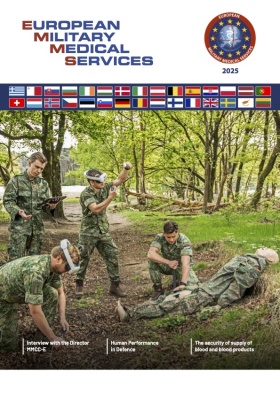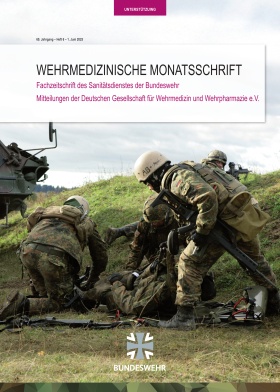
Article: Dr Monique Crane, PhD, LTCOL (Dr) Andrew Cohn, D Clin Psych, COL (Dr) Stephanie Hodson (PhD) Defence Directorate of Mental Health.
PSYCHOLOGICAL RESILIENCE TRAINING IN THE AUSTRALIAN DEFENCE FORCE
Fundamental to being employed within the Australian Defence Force (ADF) is the requirement to perform effectively in adverse, potentially dangerous and high risk situations. The Australian Department of Defence (ADF) is currently confronted with members returning from deployments in Iraq and Afghanistan, who have been exposed to situations that may result in the development of mental health problems. In an attempt to mitigate the development of such problems in ADF personnel, a significant amount of research and development is occurring in the field of psychological resilience.
Fundamental to being employed within the Australian Defence Force (ADF) is the requirement to perform effectively in adverse, potentially dangerous and high risk situations. The Australian Department of Defence (ADF) is currently confronted with members returning from deployments in Iraq and Afghanistan, who have been exposed to situations that may result in the development of mental health problems. In an attempt to mitigate the development of such problems in ADF personnel, a significant amount of research and development is occurring in the field of psychological resilience.
In general, psychological resilience relates to the ability of an individual, organisation or other meaningful social unit to adapt to the experience of hardship or threat (Bowles & Bates, 2010).Psychological resilience in the military context is defined as the “sum total of psychological processes that permit individuals to maintain or return to previous levels of well-being and functioning in response to adversity” (Zamorski, 2008, p. 7). This definition was developed by the Technical Panel 13 (TTP-13) which is part of the Technical Co-operation Program (TTCP) of which the ADF is a member. TTP-13 is a five-nation (Australia, United States, United Kingdom, New Zealand and Canada) collaborative to tackle issues relating to occupational mental health in the military context.
The Defence Directorate of Mental Health (DMH), established in 2002, provides oversight and direction for the ADF Mental Health Strategy. The Prevention and Resilience Program within DMH is conducting a range of resilience-focused initiatives that include the Longitudinal ADF Study Evaluating Resilience (Project LASER), and the development and evaluation of psychological resilience programs for ADF members. These two major initiatives are a part of the ADF Mental Health ‘Lifecycle’ scheme established by the Government in 2007 and they were strongly supported by Professor David Dunt in his Review of Mental Health Care in the ADF and Transition through Discharge, which was released in May 2009.
This article focuses on the psychological resilience training programs that are being developed to enhance the coping skills of ADF personnel. The core resilience training program, referred to as BattleSMART (Self- Management and Resilience Training), aims to develop both arousal reduction techniques (i.e. the Self-Management component) and adaptive cognitive and behavioural coping strategies.Through the use of evidence-based cognitive-behavioural techniques, personnel are taught to identify adaptive from maladaptive responses to stressful situations and adjust their responses as necessary. The article also outlines the origins and empirical support for the ADF psychological resilience training program.
The theoretical origins of ADF resilience training
The theoretical origins of the ADF resilience training program lie in the Transactional Model of Stress and Coping (Lazarus & Folkman, 1984) which emphasises that coping is the ability to manage internal and external demands appraised as adverse or exceeding one’s ability. Resilience training in the ADF draws heavily from the Stress and Coping Model in several ways. Firstly, the model focuses on the processes that assist people to manage stressful situations, as opposed to a focus on personality dispositions (Kobasa, Maddi, & Courington, 1981; Kobasa, Maddi, & Kahn, 1982).
Secondly, the processes identified in the stress and coping model (Lazarus & Folkman, 1984) are thought to be relevant to the management of a wide range of stressful situations. This is especially relevant in a military context where ADF members may be exposed to a variety of stressful situations, such as moving one’s family on posting, to being deployed on operations.
Thirdly, a central component of the stress and coping model and a key teaching point of psychological resilience training in the ADF is that cognitive appraisals of a situation are thought to mediate a person’s response to their environment.
Finally, according to the stress and coping model (Lazarus & Folkman, 1984), an individual’s response to a situation is largely determined by their personal perceptions of that situation. This response is referred to as the primary appraisal, which has the aim of evaluating whether an event is a threat to self (physical or psychological) or to significant others. A secondary appraisal is then made, where the person evaluates what can be done to improve or prevent the event. That is, appraisals are made about the controllability of the event. Lazarus and Folkman (1984) emphasise the need for individuals to make realistic appraisals of the event and for the style of coping used to match the actual level of controllability in the stressful situation. For example, greater distress may result from attempts to control situations that are uncontrollable, such as a death in the family.
In order to deal with the wide range of stressful situations that are encountered in everyday life, it is apparent that no single style of coping strategy is adaptive across all stressful situations. Rather, it is flexibility in the use of these strategies that contributes to psychological resilience. Recent research (Bun Lam and McBride-Chang, 2007) examined whether coping flexibility would buffer the adverse effects of stressful life events. The authors found that coping flexibility mitigated the impact of stressful life events on psychological distress. In other words, compared to those who did not employ coping flexibility following a stressful event, those who used a greater range of coping strategies, reported less psychological distress.
Dawson (2000) demonstrated a link between the use of coping strategies and levels of emotional distress amongst soldiers in recruit training at the Army Recruit Training Centre (ARTC). Specifically, ‘avoidant’ coping styles (i.e. self-blame, denial, rumination and venting) were predictive of poorer psychological adjustment and failure to complete recruit training. Alternatively, those recruits who engaged in problem-focused coping strategies (i.e. planning and problem-solving) reported less emotional distress, and were more likely to complete training. Based on these findings, Dawson (2000) recommended that cognitive behavioural interventions be implemented in the initial weeks of ADF recruit training in order to teach recruits adaptive styles of coping in the recruit training context.
The evidence for training in coping strategies within the ADF
A study conducted in 2003, and reported in Cohn and Pakenham (2008), evaluated the efficacy of a brief cognitive behavioural program in modifying causal attributions, expectancy of control, coping strategies and psychological adjustment in a sample of Australian Army soldiers who were undergoing the 45-day recruit training program at ARTC. The results indicated that, compared to a control group, those who received the brief coping skills intervention reported more helpful and realistic attributions for their problems during training, and reported less use of self-blame, and better psychological adjustment at the end of training. This coping skills program developed by Cohn and Pakenham (2008) was introduced for delivery to Army recruits at ARTC as of July 2006.
The ADF has psychological screening processes in place that monitor the wellbeing of personnel on deployment. In late 2007, these processes highlighted the need to enhance the stress management or arousal regulation skills of ADF personnel to help them in dealing effectively with the complex demands of modern operational environments. This requirement was briefed to senior leadership in Army who directed that arousal regulation skills training be implemented across the Army training continuum.
In January 2009, the coping skills program at ARTC was enhanced with the teaching of arousal reduction skills (i.e. controlled breathing and grounding). The importance of arousal regulation during and immediately after a stressful event has been highlighted in recent empirical work (e.g. Bryant, Creamer, O’Donnell, Silove, & McFarlane, 2008). These authors found that elevated physiological arousal (i.e. heart and respiration rate), at the time of and immediately following a traumatic event, was a significant predictor of the later development of posttraumatic stress disorder. In mid-2009, the enhanced coping skills training program was redeveloped and branded as BattleSMART.
A new generation of coping skills and resilience training: BattleSMART
The resilience training program that is currently being delivered in the ADF is an attempt to capitalise on the research findings that people who use a broad range of coping strategies display greater adaptability and resilience in the face of adversity. Using a range of cognitive-behavioural techniques, the BattleSMART program aims to teach and encourage ADF members to accurately appraise their stressful situations and use a range of adaptive coping strategies to assist them in dealing with a range of potentially stressful situations they may encounter during military service.
The training identifies four key response areas (i.e. physical, thoughts, emotions and behaviours) that may indicate and promote poor or optimal performance in a stressful situation. The program teaches personnel to test whether their initial response to a situation is the optimal response, and then identifies a series of ways to change or adjust the response if required.
The future of resilience training in the ADF
Researchers within the ADF are conducting trials evaluating the efficacy of the BattleSMART program in specific training establishments. This research is being conducted in collaboration with Dr Amy Adler, a senior researcher in the US military who is involved in similar trials with the US Army recruits at Fort Jackson (Kappler, 2009). Data from these trials is being used to determine the effectiveness of the training and direct future modifications in areas where the training is unsuccessful. Further, Project LASER will identify the predictors that lead to long-term healthy adjustment to service in the ADF and will be used to guide the priorities for resilience training.
In addition to the introduction of BattleSMART at the initial stage of an ADF member’s career, other versions are being developed in 2010 for delivery at other important career points (i.e. pre and post-deployment, and during preparation for transitioning out of the ADF into civilian life).
Conclusion
This article has reviewed the theoretical and empirical concepts that have contributed to and formed the basis of the ADF’s present approach to resilience training. The ADF is currently utilising psychological theory and research to develop an evidence-based and comprehensive psychological resilience training program that will enhance members’ ability to cope effectively with potentially adverse, dangerous and high risk situations. The goal of the program is to give the personnel who both protect and represent Australia the broadest range of adaptive coping strategies and hence, the capacity to adjust to the sometimes challenging roles faced by ADF members.
| References: Bryant, R.A., Creamer, M., O’Donnell, M., Silove D., & McFarlane, A.C. (2008). A multisite study of initial respiration rate and heart rate as predictors of posttraumatic stress disorder. Journal of Clinical Psychiatry, 69(11), 1694-1701. Bowles, S. V., & Bates, M. J., (2010) Military Organizations and Programs Contributing to Resilience Building. Military Medicine, 175 (6), 382-385. Bun Lam, C., & McBride-Chang, C. A. (2007). Resilience in young adulthood: The moderating influences of gender-related personality traits and coping flexibility. Sex Roles, 56 (3-4), 159-172. Cohn, A., & Pakenham, K. I. (2008). Efficacy of a cognitive-behavioural program to improve psychological adjustment among soldiers in recruit training. Military Medicine, 173(12), 1151-1158. Dawson, K. J. (2000). Psychological adjustment to basic military training: application of a stress and coping model. Unpublished thesis. Kappler, S. (2009, July 31). Chief of Staff previews new Army program aimed at combating stress. US Army News. Retrieved 1 March 2010 from http://www.army.mil/-news/2009/07/31/25291-chief-of-staffpreviews- new-army-program-aimed-at-combating-stress/ Kobasa, S.C.; Maddi, S. R. & Courington, S. (1981) Personality and constitution as mediators in the stress-illness relationship. Journal of Health and Social Behavior, 22, 368-378. Kobasa, S. C.; Maddi, S. R. & Kahn, S. (1982). Hardiness and health: A prospective study. Journal of Personality and Social Psychology, 42, 168-177. Lazarus R.S., & Folkman, S. (1984). Stress, appraisal, and coping. New York: Springer. Zamorski, M. (2008). Defining resilience: An international perspective [PowerPoint slides]. Retrieved from http://www.imta.info/PastConferences/Presentations.aspx?Show=2008. |
About the Authors:
COL Stephanie Hodson, PhD.COL Stephanie Hodson graduated from James CookUniversity with a BPsych (Hons) in 1990.After joining the Australian Army in 1991, she worked in a range of fields of psychology including policy, research and counselling duties. In 2002, she completed her PhD in psychology at MacquarieUniversity researching the impact of operational deployment and in 2003 completed the Joint Command and Staff Course. From 2006 to 2007, COL Hodson was the Commanding Officer of the 1st Psychology Unit and deployed with force extraction teams to the Middle East Area of Operations and Timor L'este. She was awarded a Conspicuous Service Crossfor her contribution during this period. COL Hodson is currently the Director of Mental Health in Joint Health Command.
LTCOL Andrew Cohn, D Clin Psych graduated with a Bachelor of Science degree in Psychology in 1987 from the University of NSW and gained a commission in the Australian Army as a Psychology Officer in June 1987.He worked in a wide range of posting roles, including counselling, recruiting and research.In 2005, Lieutenant Colonel Cohn completed a Professional Doctorate of Clinical Psychology through the University of Queensland.The coping skills program he designed for his research has been developed into the resilience training program which is delivered to ADF recruits.He was promoted to Lieutenant Colonel in Jan 2006, and is currently posted as the SO1 Mental Health at the Directorate of Mental Health.LTCOL Cohn was awarded a Conspicuous Service Cross in 2010 for his work in resilience and his service at the Directorate of Mental Health.
By: Dr Monique Crane, PhD, LTCOL (Dr) Andrew Cohn, D Clin Psych, COL (Dr) Stephanie Hodson (PhD) Defence Directorate of Mental Health.
Dr Monique Crane, PhD. Dr Crane has a PhD in Social and Applied Organisational Psychology from The Australian National University.Dr Crane began employment as a research fellow with the Directorate of Mental Heath in January 2009. She is currently involved in research examining the nature of resilience within in the ADF and evaluating the efficacy of ADF resilience training programs within the ADF.
Date: 12/01/2011
Source: MCIF 4/16











